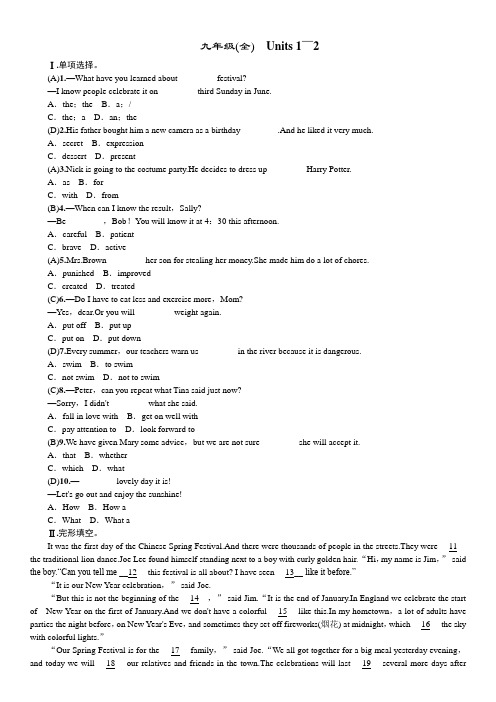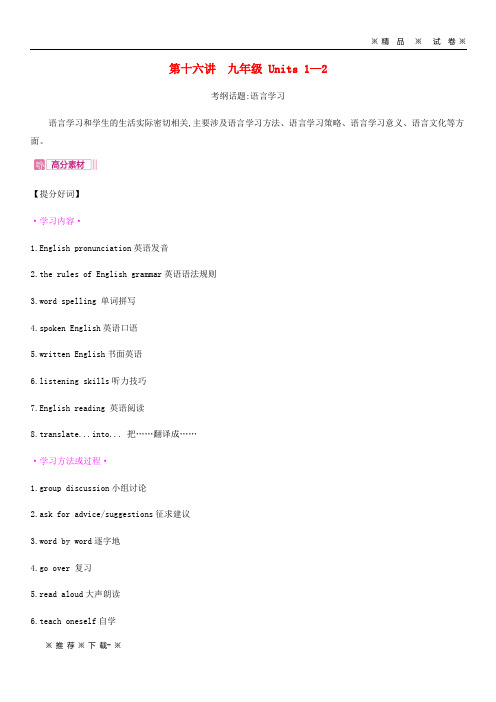2020届中考英语总复习知识点梳理第16讲九全Units1_2试题
- 格式:docx
- 大小:19.08 KB
- 文档页数:3


九年级(全)Units 1~2Ⅰ.单项选择。
(A)1.—What have you learned about ________ festival?—I know people celebrate it on ________ third Sunday in June.A.the;the B.a;/C.the;a D.an;the(D)2.His father bought him a new camera as a birthday ________.And he liked it very much.A.secret B.expressionC.dessert D.present(A)3.Nick is going to the costume party.He decides to dress up ________ Harry Potter.A.as B.forC.with D.from(B)4.—When can I know the result,Sally?—Be ________,Bob!You will know it at 4:30 this afternoon.A.careful B.patientC.brave D.active(A)5.Mrs.Brown ________ her son for stealing her money.She made him do a lot of chores.A.punished B.improvedC.created D.treated(C)6.—Do I have to eat less and exercise more,Mom?—Yes,dear.Or you will ________ weight again.A.put off B.put upC.put on D.put down(D)7.Every summer,our teachers warn us ________ in the river because it is dangerous.A.swim B.to swimC.not swim D.not to swim(C)8.—Peter,can you repeat what Tina said just now?—Sorry,I didn't ________ what she said.A.fall in love with B.get on well withC.pay attention to D.look forward to(B)9.We have given Mary some advice,but we are not sure ________ she will accept it.A.that B.whetherC.which D.what(D)10.—________ lovely day it is!—Let's go out and enjoy the sunshine!A.How B.How aC.What D.What aⅡ.完形填空。

第16课时九年级(全)Units 1-2,基础知识梳理重点单词1。
textbook n。
教科书;课本2.conversationn。
交谈;谈话3.sentence n.句子4.secret n。
秘密;秘诀adj.秘密的;保密的5.grammar n。
语法6.repeat v. 重复;重做7.note n. 笔记;记录v.注意;指出8.physics n.物理;物理学9.increase v。
增加;增长10.speed n. 速度11.partner n.搭档;同伴12.ability n。
能力;才能13.create v。
创造;创建14.brain n。
大脑15.attentionn. 注意;关注16.reviewv.&n. 回顾;复习17.knowledgen。
知识;学习18.pound n. 磅(重量单位);英镑(英国货币单位)19。
dessert n.(饭后)甜点;甜食20.garden n.花园;园子21.admire v。
欣赏;仰慕22.tie n. 领带v. 捆;束23.treat n。
款待;招待v。
招待;请(客)24.Christmasn. 圣诞节25.novel n。
(长篇)小说26.businessn。
生意;商业27.warn v. 警告;告诫28.present n。
现在;礼物adj。
现在的词汇拓展1.relationn.→relationshipn。
关系;联系→relative n。
亲属;亲戚2.chemistryn.→chemicaladj. 与化学有关的;化学的3.pronouncev.→pronunciationn。
发音;读音4.expressv.→expressionn.10。
lie v.→lay(过去式)→lain(过去分词)→lying (现在分词)存在;平躺;处于11.die v.→death n. 死;死亡→dead adj。
死的;失去生命的→dying (现在分词)adj。


第十六讲九年级 Units 1—2考纲话题:语言学习语言学习和学生的生活实际密切相关,主要涉及语言学习方法、语言学习策略、语言学习意义、语言文化等方面。
【提分好词】·学习内容·1.English pronunciation英语发音2.the rules of English grammar英语语法规则3.word spelling 单词拼写4.spoken English英语口语5.written English书面英语6.listening skills听力技巧7.English reading 英语阅读8.translate...into... 把……翻译成……·学习方法或过程·1.group discussion小组讨论2.ask for advice/suggestions征求建议3.word by word逐字地4.go over 复习5.read aloud大声朗读6.teach oneself自学7.write down写下8.learn about了解;学习9.tell a story讲故事10.read newspapers看报纸11.listen to the tape听磁带12.ask questions提问题13.solve the problem解决问题14.pay attention to注意;关注e up with 想出;想到·其他·1.main idea主旨大意2.body language肢体语言3.take an exam参加考试4.make a mistake犯错误5.make progress取得进步6.be able to do sth. 能够做某事7.have difficulty (in) doing sth. 做某事有困难【提分好句】·学习方法或过程·1.Practice makes perfect.熟能生巧。

精品文档,欢迎下载!第16讲九年级Units1-21.重点单词(1)教科书;课本:textbook(2)conversation:交谈;谈话(3)aloud:大声地;出声地(4)pronunciation:发音;读音(5)sentence:句子(6)patient:adj.有耐心的n.病人(7)express(n.):expression(8)发现;发觉:discover(9)secret:n.秘密;秘诀adj.秘密的;保密的(10)grammar:语法(11)repeat:重复;重做(12)note:n.笔记;记录v.注意;指出(13)物理;物理学:physics (14)化学:chemistry(15)pronounce:发音(16)increase:增加;增长(17)速度:speed(18)partner:搭档;同伴(19)born:v.出生adj.天生的(20)able(n.):ability(21)create:创造;创建(22)大脑:brain(23)active:活跃的;积极的(24)attention:注意;关注(25)connect:(使)连接;与……有联系(26)回顾;复习:review(27)知识;学问:knowledge(28)wise(adv.):wisely(29)strange(n.):stranger(30)relative:亲属;亲戚(31)pound:磅;英镑(32)steal:偷;窃取(33)lay:放置;安放;产(卵);下(蛋)(34)甜点;甜食:dessert(35)花园;园子:garden(36)admire:欣赏;仰慕(37)tie:n.领带v.捆;束(38)treat:n.款待;招待v.招待;请(客)(39)圣诞节:Christmas (40)lie:存在;平躺;处于(41)小说:novel(42)die(adj.):dead/dying(43)生意;商业:business(44)punish:处罚;惩罚(45)warn:警告;告诫(46)present:n.现在;礼物adj.现在的(47)warm(n.):warmth (48)spread:v.传播;展开n.蔓延;传播2.重点短语(1)ask sb.for help:请求某人的帮助(2)improve one s speaking skills:提髙某人说的能力(3)spoken English:英语口语(4)look up:(在词典、参考书中或通过电脑)查阅;抬头看(5)read word by word:逐字逐句地读(6)be patient:耐心点儿(7)be afraid to do sth.:不敢做某事(8)be born with:天生具有(9)take notes:记笔记(10)make mistakes in grammar:犯语法错误(11)pay attention to:注意(12)connect...with...:把……和……连接或联系起来(13)worry about:为……而担忧(14)Practice makes perfect.:熟能生巧。
第十六讲九年级 Unit 1—Unit 2 单元话题Unit 1 Learning how to learn (学会如何学习)Unit 2 Festivals(节日)熟词生义1.note (n.)①便条 I was going to write Kathy a note,but I decided to call her instead.我原来准备给凯茜写个便条,但又决定还是给她打电话。
②纸币,钞票 a ten-pound note一张十英镑的纸币2.speed(v.)(过去式/过去分词:sped)①快速前行 He sped away on his bike.他飞快地骑着车走了。
②超速行驶 The police caught him speeding.警察发现他超速行驶。
3.review (v.)给(书、戏剧、电影等)写评论 My father likes to review a film after he sees it.我爸爸喜欢看完电影后写影评。
(n.)(书、戏剧、电影等的)评论:The film Dying To Survive got very good reviews.《我不是药神》这部电影大获好评。
4.business (n.)①公司,企业,商业机构 They don't know how to run a big business.他们不知道如何经营一家大公司。
②商务,公事 She's in New York this week on business.她这个星期在纽约出差。
③归(某人)管的事 It's none of your business how much I weigh.我体重多少跟你无关。
词汇拓展1.loud (adj.)→(adv.) 大声地;出声地→(adv.)喧闹地;大声地2.pronounce (v.)→ (n.) 发音3.patience (n.)→ (adj.)有耐心的 (n.) 病人→ (adj.)没有耐心的;没有耐性的4.express(v.) →(n.) 表情;表示;表达方式5.discover (v.) → (n.) 发现6.able(adj.) →(n.)能力;才能→(adj.)不会的;不能的7.create (v.) →(adj.)有创造力的→(n.)创造(物);作品8.active (adj.) → (adv.)活跃地;积极地→(n.)活动9.connect(v.)→ (n.) 连接;联系10.knowledge (n.) → (adj.)知识渊博的11.wise(adj.) → (adv.)明智地;聪明地→(n.)智慧12.strange (adj.) →(n.) 陌生人13.steal (v.) →(过去式)→(过去分词)偷;窃取y (v.)→(过去式/过去分词)放置;安放;产(卵);下(蛋)15.lie (v.)→(过去式)→(过去分词)存在;平躺;处于16.die(v.) →(adj.)死的;失去生命的→ (n.) 死亡;去世17.business (n.) →(n.) 商人18.punish (v.) → (n.) 处罚;惩罚19.warm (adj.) →(n.)温暖;暖和20.spread (v.& n.)→(过去式/过去分词)传播;展开短语归纳1. (在词典、参考书中或通过电脑)查阅;抬头看2. 做笔记3. 天生具有4. 取决于;视……而定5.pay attention to6. 把……和……连接或联系起来7. 增加(体重);发胖8. 和……相似y out10.end up情景交际•谈论如何学习•谈论节日1.—How do you learn English? 你是怎样学英语的?—. 我通过小组学习的方式来学习。
U1—2重点短语句型和练习第一部分:一、阅读理解。
Stress is everywhere in our everyday life. Not only men have it, but also women and young people. The most important reasons of stress are: death, diseases, exams, making money, getting married, moving houses, changing jobs, ending friendships and so on.How do you know whether you have stress? Could you give your answers to the following questions?Stress Testwith stress. So what can you do about it?Doing relaxing exercises, talking with friends and listening to light music are all usual ways of relieving(减轻) stress. However, doctors now say that there are easier ways. Their advice is that people should laugh and smile more often. When you laugh and smile, your body relaxes. They also say that people, especially men, should cry more often, because crying is the natural way of relieving stress.16. Which of the following is the reason of stress?A. Changing officesB. Taking exams.C. Sleeping badly.D. Crying often.17. How do you know you are suffering from stress?① feel sleepy.② drink much.③ hide feelings④ find it difficult to relax.A. ① and ②B. ② and ③C. ③ and ④D. ① and ④18. The easier ways doctors advise are .A. exercisesB. laugh and cryC. music and talkingD. sleeping and eating19. What can you learn from the passage?A. For stress, men suffer more than women and the old more than the young.B. If you answer "Yes" to more than three of these questions, you are with stress.C. Only some personal problems such as losing lovers could cause stress.D. Men should cry more often because crying is the natural way to deal with stress. 参考答案16. B 17. C 18. B 19. D 20. B二、任务型阅读。
第16讲九年级Units 1-2
1.重点单词
(1)教科书;课本: textbook (2)conversation: 交谈;谈话
(3)aloud: 大声地;出声地(4)pronunciation: 发音;读音
(5)sentence: 句子(6)patient: adj.有耐心的n.病人
(7)express(n.): expression (8)发现;发觉: discover
(9)secret: n.秘密;秘诀adj.秘密的;保密的
(10)grammar: 语法(11)repeat: 重复;重做
(12)note: n.笔记;记录v.注意;指出(13)物理;物理学: physics (14)化学: chemistry (15)pronounce: 发音
(16)increase: 增加;增长(17)速度: speed
(18)partner: 搭档;同伴(19)born: v.出生adj.天生的
(20)able(n.): ability (21)create: 创造;创建
(22)大脑: brain (23)active: 活跃的;积极的
(24)attention: 注意;关注 (25)connect: (使)连接;与……有联系(26)回顾;复习: review (27)知识;学问: knowledge
(28)wise(adv.): wisely (29)strange(n.): stranger
(30)relative: 亲属;亲戚(31)pound: 磅;英镑
(32)steal: 偷;窃取(33)lay: 放置;安放;产(卵);下(蛋)
(34)甜点;甜食: dessert (35)花园;园子: garden
(36)admire: 欣赏;仰慕(37)tie: n.领带v.捆;束
(38)treat: n.款待;招待v.招待;请(客) (39)圣诞节: Christmas (40)lie: 存在;平躺;处于(41)小说: novel
(42)die(adj.): dead/dying (43)生意;商业: business
(44)punish: 处罚;惩罚(45)warn: 警告;告诫
(46)present: n.现在;礼物adj.现在的(47)warm(n.): warmth (48)spread: v.传播;展开n.蔓延;传播
2.重点短语
(1)ask sb. for help: 请求某人的帮助
(2)improve one s speaking skills: 提髙某人说的能力
(3) spoken English :英语口语
(4)look up: (在词典、参考书中或通过电脑)查阅;抬头看
(5)read word by word: 逐字逐句地读
(6) be patient :耐心点儿(7)be afraid to do sth.: 不敢做某事
(8)be born with: 天生具有(9)take notes: 记笔记
(10)make mistakes in grammar: 犯语法错误
(11)pay attention to: 注意
(12)connect...with...: 把……和……连接或联系起来
(13)worry about: 为……而担忧
(14)Practice makes perfect.: 熟能生巧。
(15)put on: 增加(体重);发胖(16)lay out: 摆开;布置
(17)share sth. with sb.: 与……分享……
(18)as a result: 结果(19) dress up :乔装打扮
(20) play a trick on sb. :捉弄某人(21)warn sb. to do sth.: 警告某人做某事
(22)the beginning of new life: 新生命的开始
(23)end up: 最终成为;最后处于
3.重点句子
(1) How do you study for a test? 你怎样为考试而学习的?
(2)I study by making word cards. 我通过制作单词卡片来学习。
(3) It s too hard to understand spoken English. 英语口语太难懂了。
(4)Why did Wei Fen find it difficult to learn English?为什么魏芬觉得学英语很难?
(5)I think that they re fun to watch . 我认为它们看着很有意思。
4.交际用语
(1)Well, be patient. It takes time . 耐心点儿!这需要时间的。
(2) That doesn t sound too bad. 那听起来不是很糟糕。
(3)—Have you ever studied with a group?你曾经参加过学习小组吗?
—Yes, I have. I ve learned a lot that way.
是的,我参加过。
我已经通过那种方式学到了不少 (东西)。
(4) It s a piece of cake. 小菜一碟/太容易了。
(5) What a great day! 多么美好的一天!
(6) Yes,I think so. 是的,我觉得是这样的。
5.语法
(1)by引导的方式状语;(2)that, if与whether引导的宾语从句。